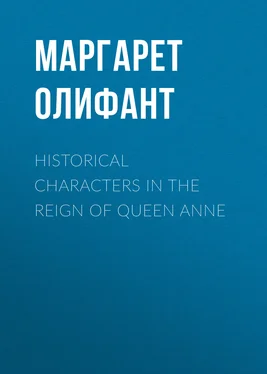Маргарет Олифант - Historical Characters in the Reign of Queen Anne
Здесь есть возможность читать онлайн «Маргарет Олифант - Historical Characters in the Reign of Queen Anne» — ознакомительный отрывок электронной книги совершенно бесплатно, а после прочтения отрывка купить полную версию. В некоторых случаях можно слушать аудио, скачать через торрент в формате fb2 и присутствует краткое содержание. Жанр: foreign_prose, История, foreign_edu, foreign_antique, на английском языке. Описание произведения, (предисловие) а так же отзывы посетителей доступны на портале библиотеки ЛибКат.
- Название:Historical Characters in the Reign of Queen Anne
- Автор:
- Жанр:
- Год:неизвестен
- ISBN:нет данных
- Рейтинг книги:3 / 5. Голосов: 1
-
Избранное:Добавить в избранное
- Отзывы:
-
Ваша оценка:
- 60
- 1
- 2
- 3
- 4
- 5
Historical Characters in the Reign of Queen Anne: краткое содержание, описание и аннотация
Предлагаем к чтению аннотацию, описание, краткое содержание или предисловие (зависит от того, что написал сам автор книги «Historical Characters in the Reign of Queen Anne»). Если вы не нашли необходимую информацию о книге — напишите в комментариях, мы постараемся отыскать её.
Historical Characters in the Reign of Queen Anne — читать онлайн ознакомительный отрывок
Ниже представлен текст книги, разбитый по страницам. Система сохранения места последней прочитанной страницы, позволяет с удобством читать онлайн бесплатно книгу «Historical Characters in the Reign of Queen Anne», без необходимости каждый раз заново искать на чём Вы остановились. Поставьте закладку, и сможете в любой момент перейти на страницу, на которой закончили чтение.
Интервал:
Закладка:
I have been very desirous of some safe opportunity to make you a sincere and humble offer of my duty and submission, and to beg you will be assured that I am both truly concerned for the misfortunes of your condition, and sensible as I ought to be of my own unhappiness: as to what you may think I have contributed to it, if wishes could recall what is past, I had long since redeemed my fault. I am sensible that it would have been a great relief to me if I could have found means to have acquainted you earlier with my repentant thoughts, but I hope they may find the advantage of coming late—of being less suspected of insincerity than perhaps they would have been at any time before. It will be a great addition to the ease I propose to my own mind by this plain confession, if I am so happy as to find that it brings any real satisfaction to yours, and that you are as indulgent and easy to receive my humble submissions as I am to make them in a free disinterested acknowledgment of my fault, for no other end but to deserve and receive your pardon.
These involved and halting sentences by themselves could afford but little satisfaction to the anxious banished court at St.-Germain. To say so much, yet to say so little, though easy to a confused intelligence, not knowing very well what it meant, is a thing which would have taxed the powers of the most astute conspirators. But there could be little doubt that a penitent princess thus ready to implore her father’s pardon, would be a powerful auxiliary, with the country just then in the stage of natural disappointment which is prone to follow a great crisis, and that Marlborough was doubly dangerous with such a card in his hands to play.
A little pause occurred after his dismissal. The court by this time had gone to Kensington, out of sight and hearing of the Cockpit, Whitehall having been burned in the previous year. The princess continued, no doubt in no very friendly mood, to take her way to the suburban palace in the evenings and make one at her sister’s game of basset, showing by her abstraction, and the traces of tears about her eyes, her state of depression yet revolt. But about three weeks after that great event, something suggested to Lady Marlborough the idea of accompanying her princess to the royal presence. It was strictly within her right to do so, in attendance on her mistress, and perhaps it was considered in the family council at the Cockpit that the existing state of affairs could not go on, and that it was best to end it one way or another. One can imagine the stir in the ante-chambers, the suppressed excitement in the drawing-room, when the princess, less subdued than for some weeks past, her eyes no longer red, nor the corners of her mouth drooping, came suddenly in out of the night, with the well-known buoyant figure after her, proud head erect and eyes aflame, her mistress’s train upon her arm, but the air of a triumphant queen on her countenance. There would be a pause of consternation—and for a moment it would seem as if Mary, thus defied, must burst forth in wrath upon the culprit. What glances must have passed between the court ladies behind their fans! What whispers in the
corners! The queen, in the midst, pale with anger, restraining herself with difficulty; the princess, perhaps beginning to quake; but Sarah, undaunted, knowing no reason why she should not be there—“since to attend the princess was only paying her duty where it was owing.”
But next morning brought, as they must have foreseen it would bring, a royal missive, meant to carry dismay and terror, in which Mary commanded her sister to dismiss her friend and make instant submission. “I tell you plainly Lady Marlborough must not continue with you in the circumstances in which her lord is,” the queen wrote; “never anybody was suffered to live at court in my Lord Marlborough’s circumstances.” There is nothing undignified in Mary’s letter. She was in all respects more capable of expressing herself than her sister, and she had so far right on her side that Lady Marlborough’s appearance at court was little less than a deliberate insult to her. “I have all the reason imaginable to look upon you bringing her here as the strangest thing that ever was done, nor could all my kindness for you have hindered me showing you that moment, but I considered your condition, and that made me master of myself so far as not to take notice of it there,” the queen said. The princess’s condition had often to be taken into consideration, and perhaps she was not unwilling that her superiority in this respect to her childless sister should be fully evident. She was then within a few weeks of her confinement—not a moment when an affectionate and very dependent woman could lightly be parted from her bosom friend.
Thus the situation was brought to a climax. It was not to be expected, however, that Anne could have submitted to a mandate which in reality would have taken from her all power to choose her own friends; and her affections were so firmly fixed upon her beloved companion that it is evident life without Sarah would have been a blank to her. She answered in a letter studiously compiled in defense both of herself and her retainer. “I am satisfied she cannot have been guilty of any fault to you, and it would be extremely to her advantage if I could here repeat every word that ever she had said to me of you in her whole life,” says the princess; and she ends entreating her sister to “recall your severe command,” and declaring that there is no misery “that I cannot readily resolve to suffer rather than the thought of parting with her.” But things had gone too far to be stopped by any such appeal. The letter was answered by the lord chamberlain in person with a message forbidding Lady Marlborough to continue at the Cockpit. This was arbitrary in the highest degree, for the house was Anne’s private property, bought for and settled upon her by Charles III.; and it was unreasonable, for Whitehall was lying in ruins, and Queen Mary’s sight at Kensington could not be offended by the spectacle of the couple who had so annoyed her. The princess’s spirit was roused. She wrote to her sister that she herself would be “obliged to retire,” since such were the terms of her continuance, and sent immediately to the Duke of Somerset to ask for a lease of Sion House. It is said that William so far interfered in the squabble—in which indeed he had been influential all along—as to ask the duke to refuse this trifling favor. But of all English noble houses the proud Somersets were the last to be dictated to; and Anne established herself triumphantly in her banishment on the banks of the Thames with her favorite at her side.
A child was born a little later, and the queen paid Anne an angry visit of ceremony a day or two after the event, saying nothing to her but on the vexed subject. “I have made the first step by coming to you,” Mary said, approaching the bed where the poor princess lay, sad and suffering, for her baby had died soon after its birth, “and I now expect you should make the next by removing Lady Marlborough.” The princess, “trembling, and as white as her sheet,” stammered forth her plaintive protest that this was the only thing in which she had disobliged her sister, and that “it was unreasonable to ask it of her,” whereupon Mary, without another word, left the room and the house. It was the last time they ever met, unlikely as such a thing seemed. Anne made various overtures of reconciliation, but as unconditional obedience was promised in none, Mary’s heart was not softened.
The only justification that can be offered for the queen’s behavior was that they had been long separated and had little but the formal tie of relationship to bind them to each other. Anne had been but a child when Mary left England. They were both married and surrounded by other affections when they met again. They had so much resemblance of nature that each seems to have been capable of but one passion. It was Mary’s good fortune to love her husband with all her heart—but to all appearance no one else. She had not a friend among all the ladies who had shared her life for years—no intimate or companion who could give her any solace when he was absent. Natural affection was not strong in their family. They had no mother, nor bond of common relationship except the father whom they both superseded. All this explains to a certain extent her coldness to Anne, and it is very likely she thought she was doing the best thing possible for her sister in endeavoring to separate her from an evil influence, an inferior who was her mistress. But this does not excuse the paltry and cruel persecution to which the younger sister was henceforward exposed. Every honor that belonged to her rank was taken from her, from the sentry at her door to the text upon her cushion at church. She was allowed no guard; when she went into the country the rural mayors were forbidden to present addresses to her and pay the usual honors which mayors delight to pay. The great court ladies were given to understand that whoever visited her would not be received by the queen. A more irritating and miserable persecution could not be, nor one more lowering to the character of the chief performer in it.
Читать дальшеИнтервал:
Закладка:
Похожие книги на «Historical Characters in the Reign of Queen Anne»
Представляем Вашему вниманию похожие книги на «Historical Characters in the Reign of Queen Anne» списком для выбора. Мы отобрали схожую по названию и смыслу литературу в надежде предоставить читателям больше вариантов отыскать новые, интересные, ещё непрочитанные произведения.
Обсуждение, отзывы о книге «Historical Characters in the Reign of Queen Anne» и просто собственные мнения читателей. Оставьте ваши комментарии, напишите, что Вы думаете о произведении, его смысле или главных героях. Укажите что конкретно понравилось, а что нет, и почему Вы так считаете.












